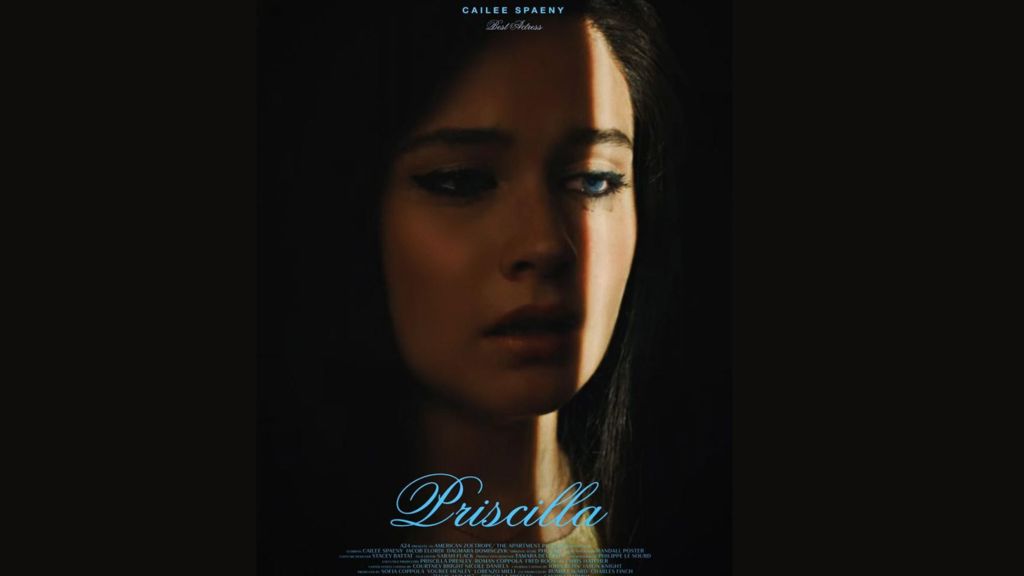Modern biopics are often hit or miss, but Priscilla effortlessly falls into the former.
Adapted from the memoir Elvis and Me and directed by Sofia Coppola, Priscilla chronicles the life of Priscilla Presley (Cailee Spaeny) during her relationship with Elvis Presley (Jacob Elordi) from their first encounter to the final farewell and divorce.
If anyone was going to direct a biopic for Priscilla, Coppola was far and away the best choice. Her intimate approach to filmmaking and familiarity with coming-of-age through the female gaze aligns perfectly with the life of Priscilla during her years with Elvis.
Oftentimes biopics will rely on larger-than-life visuals to forcefully throw the audience into the life of a person, but in Priscilla, the opposite is true. Coppola lets the performances speak for themselves, knowing exactly which shots are most important to draw out, allowing the actors to command their scenes. This technique is present throughout her entire filmography and feels like effortless work in Priscilla.
In all its quietness, Priscilla expresses a powerful integrity. To say it was made in an attempt to spit on Elvis’ grave would be a gross misunderstanding of the film which doesn’t take things as obvious as the title into account. The film examines Elvis in an unfiltered way through Priscilla’s eyes that feels empathetic to the questionable parts of their relationship. Immediately from their first encounter, the film strips back any legacy or fame protecting Elvis and shows how problematic his attraction to a fourteen-year-old girl really was.
Compared to the larger-than-life biopics in recent years like Bohemian Rhapsody (2018), Rocketman (2019) and (ironically) Elvis (2022), Priscilla is more subdued. It is first and foremost a biopic, but Coppola’s experience with coming-of-age stories humanizes Priscilla. This hybrid of genres makes her feel like less of an untouchable celebrity shielded by her partner’s fame and more of a person thrown into an unfamiliar world and crafted to fit a role – which was in fact the case.
Spaeny’s performance breaks away from the typical biopic lead. Unlike other actors who adopt a fantastical commitment to the role, Spaeny’s method feels grounded in reality. She’s presented as an ordinary girl brought into the world of fame, continuously made to believe that the life being crafted for her was every girl’s dream. Even in the euphoric highs of their relationship, Priscilla exudes hesitancy evident in Spaeny’s subtle expressions.
Between Coppola’s masterful filmmaking and Spaeny’s impressive performance, the film becomes a dark fairytale. Spaeny’s acting reflects polarizing emotions over resigning herself to the life crafted for her as Elvis’ partner. Oftentimes she conveys her emotions with only her face and eyes. Her technique pulls the audience into Priscilla’s experience even in scenes where she stays quiet whilst surrounded by the chatter of other people.
With an airtight screenplay, the film satisfyingly uses its nearly two-hour runtime to cover pivotal moments in the relationship. For the audience it’s almost overwhelming to witness how quickly Priscilla’s life changed.
The praise for the film’s screenplay does not ignore its weaker qualities, however. In its final act, Priscilla does begin to meander; all the understated qualities used to make the audience feel closer to Priscilla begin to fade into themselves and isolate the audience from the story.
The tension between her and Elvis feels like a powder keg waiting to explode, but the climax ultimately ends in a fizzle. The plot relies on subtle changes in Priscilla’s mannerisms and interactions with Elvis to convey a shift in her attitude, but by the time she begins to fully exercise her agency, the film ends. Adding more focus on Priscilla’s decision to leave Elvis would relieve the soft tension the film progressively builds.
All criticisms considered, the positive qualities outweigh the negative ones, and the film is a polished biopic done right. It’s quiet and grounded but never inattentive to the essential details required to do the story justice, leaving with all the grace and empathy it arrived with.

